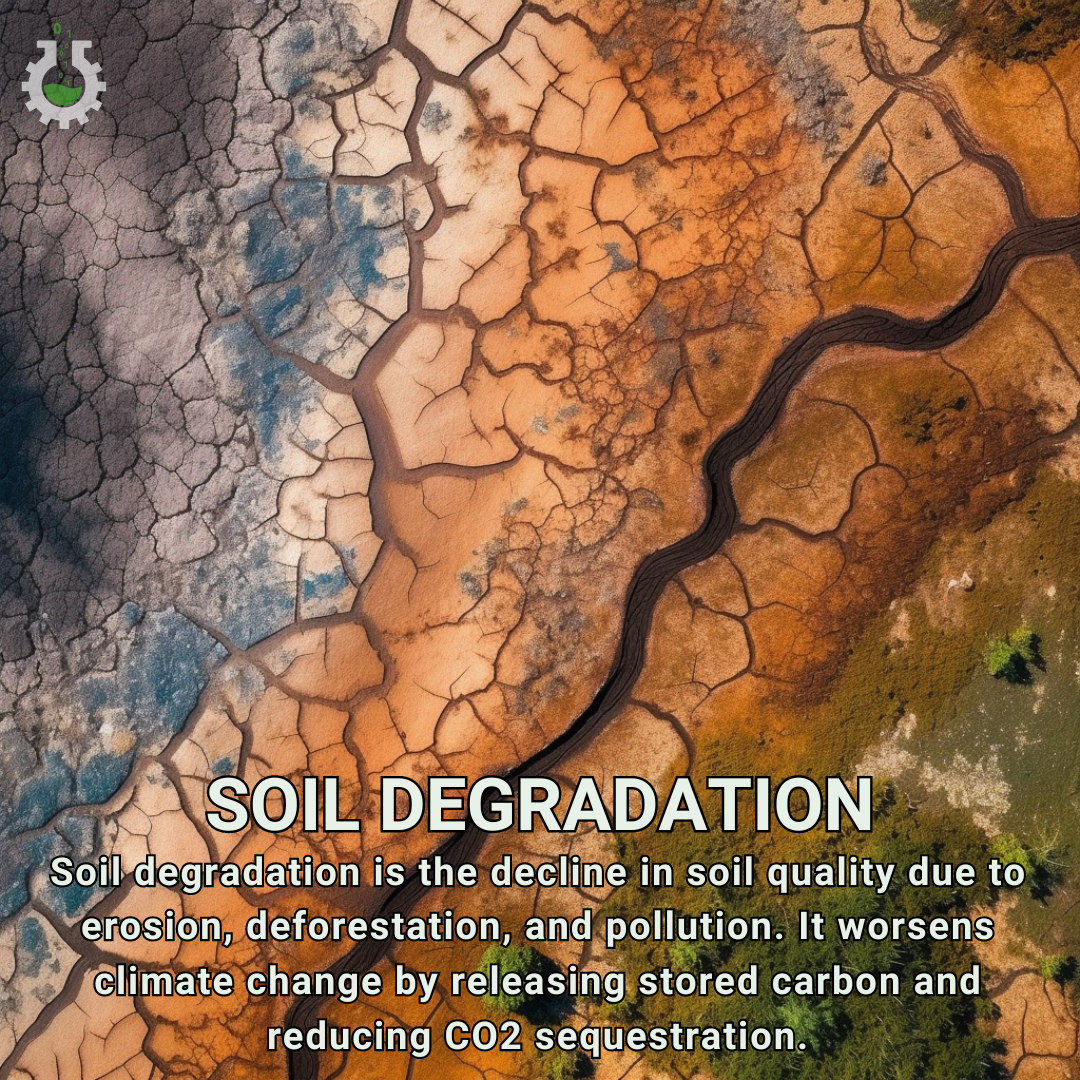June 3, 2024
Climate Change Poster Collection of the Day – Soil Degradation
Book a Demo
Today’s Climate Change Poster Collection highlights Soil degradation, a critical yet often overlooked factor in the climate change narrative, has profound implications for our planet’s health and sustainability. Healthy soils are vital for carbon sequestration, acting as significant carbon sinks that absorb carbon dioxide (CO2) from the atmosphere and store it underground. This natural process is essential in mitigating the effects of climate change, as it helps to regulate atmospheric CO2 levels. However, human activities such as deforestation, overgrazing, and unsustainable agricultural practices are leading to widespread soil degradation. These activities strip the soil of its nutrients and organic matter, resulting in erosion and a loss of its natural structure and fertility. As soils degrade, their ability to sequester carbon diminishes, releasing previously stored CO2 back into the atmosphere and contributing to the greenhouse effect.
This creates a vicious cycle where degraded soils not only lose their capacity to act as carbon sinks but also exacerbate the problem of atmospheric CO2, accelerating global warming. The loss of soil organic carbon (SOC) is particularly concerning. SOC is a critical component of soil health, influencing its ability to retain water, support plant growth, and maintain ecosystem functions. When soils are degraded, they lose SOC, reducing their productivity and resilience to environmental stresses such as droughts and floods. This loss of soil fertility can lead to a decline in agricultural yields, threatening food security and livelihoods, especially in vulnerable communities.
Moreover, soil degradation impacts biodiversity, water retention, and food security, making it a multifaceted issue that extends beyond climate change. The loss of fertile land can lead to reduced agricultural yields, threatening food supplies and livelihoods, especially in vulnerable communities. Soil erosion, a common consequence of degradation, can lead to the loss of arable land, further exacerbating food insecurity. Additionally, degraded soils are more prone to desertification, a process where fertile land becomes desert-like, rendering it unsuitable for agriculture and habitation. This can lead to displacement and migration, as communities are forced to leave their homes in search of more fertile land.
Addressing soil degradation requires a holistic approach that includes sustainable land management practices, reforestation, and the adoption of regenerative agriculture techniques. Sustainable land management practices, such as crop rotation, cover cropping, and reduced tillage, can help to maintain soil health and prevent erosion. Reforestation and afforestation efforts can restore degraded lands, enhance biodiversity, and increase carbon sequestration. Regenerative agriculture, which focuses on restoring soil health through practices such as composting, agroforestry, and holistic grazing, can help to rebuild SOC and improve the resilience of agricultural systems.
By restoring soil health, we can enhance its carbon sequestration capabilities, improve agricultural productivity, and build resilience against climate change. Healthy soils can support more diverse and productive ecosystems, providing a range of ecosystem services such as water filtration, nutrient cycling, and habitat provision. These services are essential for maintaining the health and well-being of both natural and human systems. Furthermore, restoring soil health can help to mitigate the impacts of climate change by reducing the vulnerability of agricultural systems to extreme weather events and improving their ability to adapt to changing climatic conditions.
Thus, tackling soil degradation is not just an environmental necessity but a crucial step towards a sustainable and climate-resilient future. It requires coordinated efforts at local, national, and global levels, involving governments, communities, and the private sector. Policies and incentives that promote sustainable land management and regenerative agriculture can help to drive the transition towards more sustainable and resilient agricultural systems. Public awareness and education are also important, as they can empower individuals and communities to take action to protect and restore their soils. By working together, we can address the root causes of soil degradation and build a more sustainable and resilient future for all.
Discover an inspiring collection of climate change poster.



